|
 Secure Site
Secure Site
|
 |
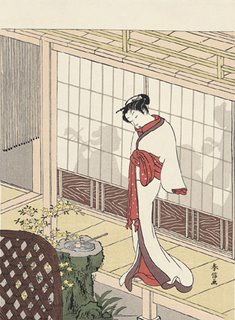 It's exquisite sounds summon your consciousness out of your meditative state with a series of subtle gongs. Once you experience the Zen Timepiece's progressive tones, you'll never want to meditate any other way. Harunobu Suzuki, Beauty at the Veranda Think again! You can channel some Zen with a technique that fits your personality:
We get it. Telling you to meditate is a whole lot easier said than done. Sure, research links it to all kinds of health benefits—stress relief, improved memory, and better blood sugar, to name a few—but that won’t do you much good if your blood pressure spikes just thinking about sitting still for five minutes. The good news is that this doesn’t mean you can’t meditate; you just haven’t found the right fit.
“Everyone can meditate,” says Sarah McLean, a meditation teacher in Sedona, Arizona, and author of Soul Centered: Transform Your Life in 8 Weeks With Meditation (May 2012; Hay House). “Any activity can become a meditative experience if you’re really present in the moment and engage your senses.
How? Simply slowing down and being mindful of what’s happening right now—rather than, say, thinking about what you ate for lunch yesterday or whether you remembered to put your clothes in the dryer—can calm your nervous system, says McLean. You mind will drift, but that doesn’t mean you’re doing it wrong. “It’s like training a puppy,” says McLean. “Stick with it and your mind will settle down.”
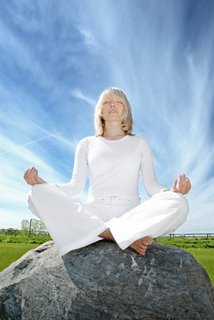 t serves as the perfect meditation timer. Available in 5 wood styles, including bamboo. Here’s how to channel some inner peace with a technique tailored to your personality.
If you’re artsy…light a candle. “Concentrating on a flame can be a good way for visual types to stay in the moment,” says McLean. Sit three feet from a flame at eye level, and watch it closely for five to 10 minutes. Continue to bring your attention back to the flame every time you notice your focus starting to drift away.
If you’re a foodie…savor each bite. Focus on a small morsel, such as a raisin, strawberry, or nut, and notice its shape, size, color, texture, and scent. Place it on your tongue, enjoying the flavor and keeping it in your mouth for as long as you can, at least 20 seconds. Chew slowly. “By turning your focus inward and concentrating on sensations such as taste and smell, eating can feel like a new, exciting experience,” says McLean.
If you’re athletic…take a hike. Try walking for 10 minutes without the iPod. As you stroll (no rushing!), stare at the ground about three feet in front of you. Notice the sound of your breath, focus on the physical sensation of the air on your skin, observe the texture of the ground in front of you. “Over time, walking meditations can train your brain to better focus on the here and now,” McLean says.
The Healing Power Of Mindfulness
If you’re a word lover…find a mantra. Sometimes your mind just needs a place to rest. Repeating calming words can give your mind that opportunity to chill. Find a quiet place and sit with your back straight but not rigid. Set a timer for 10 to 15 minutes, and repeat words that will help settle—rather than stimulate—your mind. Try saying “Let” on an inhale and “go” on an exhale, either out loud or silently to yourself. “It can help interrupt the monologue in your head and naturally settle down your thinking process,” says McLean.
adapted from Prevention, by By Holly C. Corbett
Use our unique “Zen Clock” which functions as a Yoga & Meditation Timer. It features a long-resonating acoustic chime that brings your meditation or yoga session to a gradual close, preserving the environment of stillness while also acting as an effective time signal. Our Yoga Timer & Clock can be programmed to chime at the end of the meditation or yoga session or periodically throughout the session as a kind of sonic yantra. The beauty and functionality of the Zen Clock/Timer makes it a meditation tool that can actually help you “make time” for meditation in your life. Bring yourself back to balance.
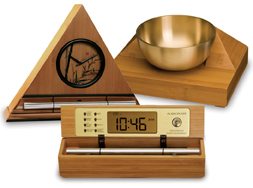 It's exquisite sounds summon your consciousness out of your meditative state with a series of subtle gongs. Now & Zen – The Gong Meditation Timer
1638 Pearl Street
Boulder, CO 80302
(800) 779-6383
Orders@now-zen.com
 The beauty and functionality of the Zen Clock/Timer makes it a meditation tool that can actually help you "make time" for meditation in your life. Bring yourself back to balance.
Posted in Bamboo Chime Clocks
 Waking up in the morning should be as pleasant as falling asleep at night. The Zen Alarm Clock's gradual, gentle awakening is transformative. Kitagawa Utamaro Ukiyoe by YukiSakuma Close your eyes, breathe deeply, and envision the space where you feel the greatest sense of joy and calm. Is it a spare, expansive beach? A lush garden? A tranquil forest? More than likely, that’s your ideal bedroom.
“If the place you feel the most peaceful is in the mountains, then include things like a photograph of mountains, essential oils of fir or juniper in a diffuser, or a bowl of pine needles,” says feng shui teacher Denise Linn, author of Sacred Space. “You won’t be able to re-create the exact environment, but there are aspects you can incorporate.”
Reinventing your bedroom as a place of beauty and serenity sets up a lasting source of renewal and replenishment, both spiritual and physical. “The bedroom is the most important place in your home for enhancing your sense of well-being,” says Linn.
No need for an expensive, time-draining makeover. Here are 10 simple ways to create a dream bedroom that nurtures your health and refreshes your spirit.
1. Soften the Colors
Bedrooms are meant to be “yin rooms,” which facilitate passive, feminine spirit rather than generate active, masculine yang energy. “Yin rooms should be calm, so you can walk into them and relax,” says Susan Levitt, author of Taoist Feng Shui. She suggests painting walls in pastels such as lavender, beige, or off-white, or in muted flesh tones like cream, taupe, and rose.
Whatever hue you choose, make it nontoxic. Many paints contain volatile organic compounds, which produce hazardous fumes when wet and may continue to release those fumes for years after drying. Debra Lynn Dadd, author of Home Safe Home, recommends buying a water-based paint that’s low in VOCs. “Brand-name paint stores such as Sherwin-Williams and Benjamin Moore carry their own nontoxic paints,” says Dadd, who also suggests sleeping elsewhere for three or four days after painting a bedroom.
Another option is using Anna Sova Luxury Organics wall finish, manufactured with up to 99 percent food-grade ingredients (from $49 a gallon; annasova.com). To enhance the soothing effects of your new colors, add a bottle of Anna Sova’s Organic Aromatherapy formula ($12). Stirred into the wall finish before painting, these essential-oil-based blends scent your room with lemon, vanilla, orange and clove, or sandalwood.
2. Clear the Clutter
You needn’t sleep in a Zen den, but a clean, open space allows you to rest better at night. Throw out—or put away—items you haven’t read, worn, or looked at in a few years. “If you don’t love it and you haven’t used it in several years, get rid of it,” says Linn. “Reducing clutter is modern-day alchemy. Anything you don’t love only drags you down.”
And don’t try to hide the clutter under your bed—even if your frame has built-in drawers, store only bedding and pillows there, Levitt advises.
Bookworms may want to keep beloved novels at hand, but too many tomes can be overwhelming. Instead of having piles everywhere, keep one or two books out in your bedroom and store the rest on a book shelf, says Levitt. Don’t pack them too tightly; leaving a little free space gives you room to grow and symbolizes the acceptance of new things in your life.
3. Purify Your Pillows
One of the best ways to purify your sleeping space is also the cheapest: Replace your current pillow with an organic cotton or wool pillow or cushion from Abundant Earth (abundantearth.com), Real Goods (realgoods.com), orRawganique.com. “Your nose is right there breathing in fumes from the foam,” says Dadd. “For less than $60, you can make a significant change in your health.” Wool offers additional benefits to allergy sufferers, since it’s naturally resistant to dust mites.
4. Tame the Decor
 The Zen Alarm Clock transforms mornings, awakening you gradually with a series of gentle acoustic chimes Once you use a Zen Clock nothing else will do Displaying photos of loved ones brings positive energy into a bedroom, as long as the wall decor is kept simple. “Don’t put up too many pictures,” says Levitt. “One per wall is plenty.” And avoid art with violent or chaotic imagery. “In feng shui, the first thing you see when you wake up is very important,” notes Linn. “If it’s a great piece of modern art, but the imagery is jagged, that’s not great for your energy.”
Some consultants advise against mirrors in the bedroom, but Levitt says they can open up the space. “Just make sure they’re not cracked, glazed, or tiled,” she adds. “Cracks show breakage and flaws; glaze doesn’t reflect clearly; and tiles break up your image, as though it’s hard to bring together different aspects of your personality.”
5. Dim the Lights
Street lamps and other outdoor lighting can wreak havoc on your sleep cycle because melatonin, the hormone that helps govern sleep, responds to light and darkness. For soundest snoozing, dim your bedroom at night with a thick, dark cotton canvas, and let in the morning sun when it’s time to wake; this will help you stay synchronized with your own body rhythms.
Lighting defines a room’s aesthetics as well. Overhead lights lack atmosphere, so install a dimmer switch or use small lamps. “Overhead lighting doesn’t belong in the bedroom,” says Dadd. “I prefer gentle lighting that puts you in an inward-looking frame of mind.”
6. Send In the Scents
Filling the air with a luscious yet subtle fragrance makes your bedroom nearly spa-like. Linn suggests adding a few drops of calming essential oil like neroli, rose, or jasmine to an aromatherapy diffuser (available from Aura Cacia for $15; frontiercoop.com), while Levitt recommends chamomile, lavender, or clary sage.
7. Clear the Air
Keeping your windows open works wonders toward purifying indoor air of dust, mold, pet dander, and chemicals from household cleaners. “Fresh outdoor air is essential for good health,” says Dadd.
Once winter rolls around, however, letting in that oh-so-cold fresh air may not seem as appealing. “But even if you crack open your window just an inch, it can help,” says building biologist Athena Thompson, author of Homes That Heal. “If you have one or two people sleeping in a closed room for eight hours, it depletes the air of oxygen and increases carbon dioxide, so you wake up feeling sluggish and headachy.” Add an extra blanket or two on chillier nights.
8. Power Down
Television picture tubes, wireless Internet connections, electrical wiring, and cellphones emit electromagnetic fields that may contribute to frequent waking, aches and pains, and muscle spasms, according to Lawrence Gust, a building biology consultant in San Marcos, Calif. To reduce your EMF load, remove electric cords and devices from the bedroom—or at least from within 8 to 10 feet of the bed—and disconnect Wi-Fi and multi-handset cordless phones.
“The time that you spend in your bedroom should allow for your body to be more connected with its own electromagnetic fields, rather than those coming from electronic devices,” says Dadd.
9. Modify the Mattress
“The bed is where you go to spend your key rejuvenating time—it’s where you wipe the slate clean,” Thompson says. But do you know what’s underneath you?
A typical foam mattress is made from petrochemical derivatives with fire retardants and other chemicals added, all of which can be absorbed through the skin. Thompson prefers mattresses made of organic cotton, pure grown wool, or natural rubber. Try Janice’s Superior Organic Cotton Mattress ($1,495 for queen-sized; janices.com) or Lifekind’s Natural Rubber Mattress ($1,595 queen;lifekind.com). If you’re not ready for such a major purchase, place a barrier cloth (available from Janice’s; queen-sized organic barrier, $269.95, or organic cover, $189.95) over your existing mattress. “It will give you a layer of natural fibers, which is more comfortable and helps you sleep better,” says Dadd.
10. Remake Your Bed
 Wake up with gradual, beautiful acoustic chimes. The Zen Alarm Clock transforms your mornings and gets you started right, with a progressive awakening When shopping for new bedding, look for 100 percent natural fibers–ideally organic cotton or organic hemp—at retailers like Gaiam (gaiam.com), Coyuchi (coyuchi.com), and Rawganique.com. To avoid chemically treated linens, make sure your purchases aren’t labeled “permanent press,” advises Dadd. “If you shop at stores like Bed, Bath & Beyond, the kinds of sheets that are untreated will be the jersey and flannel sheets,” she adds. For colors, opt for soothing shades like sage green and powder blue, says Levitt.
Even the purest fabrics expose you to chemicals if you launder them in perfumed detergents. “Commercial ‘fragrances’ represent anywhere from 10 to a few hundred chemicals, many of which have never been tested on humans,” says Thompson. “If you’re washing your bedding with fragranced detergents and drying them with fragranced dryer sheets every week, you’re going to be sleeping on another layer of chemicals all night.”
Clean your linens “the old-fashioned way, with baking soda or vinegar,” suggests Thompson. Or select detergents that are fragrance-free or have natural ingredients like orange peel.
Boulder, Colorado—an innovative company has taken one of life’s most unpleasant experiences (being startled awake by your alarm clock early Monday morning), and transformed it into something to actually look forward to. “The Zen Alarm Clock,” uses soothing acoustic chimes that awaken users gently and gradually, making waking up a real pleasure. Rather than an artificial recorded sound played through a speaker, the Zen Clock features an alloy chime bar similar to a wind chime. When the clock’s alarm is triggered, its chime produces a long-resonating, beautiful acoustic tone reminiscent of a temple gong. Then, as the ring tone gradually fades away, the clock remains silent until it automatically strikes again three minutes later. The frequency of the chime strikes gradually increase over ten-minutes, eventually striking every five seconds, so they are guaranteed to wake up even the heaviest sleeper. This gentle, ten-minute “progressive awakening” leaves users feeling less groggy, and even helps with dream recall.
adapted from Naturalhealthmag.com By Elizabeth Barker
 Wake up refreshed, love your alarm clock, transform your mornings with The Zen Alarm Clock's progressive awakening with gentle chimes. 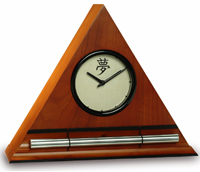 Wake up refreshed, love your alarm clock, transform your mornings with The Zen Alarm Clock's progressive awakening with gentle chimes. Now & Zen – Alarm Clocks with Gentle Sounds
1638 Pearl Street
Boulder, CO 80302
(800) 779-6383
orders@now-zen.com
Posted in sleep, Sleep Habits
 One of the ultimate Zen like experiences is waking-up from a great slumber refreshed and energized. A simple variation of yoga nidra (yogic sleep) taught by Swami Rama can help you restore your energy.
When travel (or everyday life) wears you down, a simple variation of yoga nidra (yogic sleep) taught by Swami Rama can help you restore your energy. This practice helps you settle into a profound state of rest while remaining alert at a deeper level of consciousness. By drawing your attention to your heart center, you will become a silent witness to your sleeping body and mind.
- Choose a room where you will not be disturbed. Sit on the floor against a wall, stretching your legs out and crossing one ankle over the other. Cup your palms in your lap and, with your eyes closed, either allow your head to hang forward or to rest against the wall.
- Feel the relaxed movement of your breath, letting it flow easily and smoothly. Then observe 3 to 5 breaths at the nostrils, to center your mind.
- Next, one by one, rest your awareness (and breath) at the eyebrow center, then at the throat center, and finally the heart center.
- Keeping your awareness at the heart center, quietly resolve to let your body and mind sleep for a specified length of time (say, 10 minutes). Trust your mind to awaken you when that time has elapsed.
- As you sleep, continue to be aware of the merest sensation of the breath (but no mantra). You are simply letting your body sleep, with awareness.
- Stay in this state until your mind wakes you up. Then slowly shift your head and stretch your body. Draw your attention outward, opening your eyes into your hands and then to the room around you.
Waking up in the morning should be as pleasant as falling asleep at night. The Zen Alarm Clock’s gradual, gentle awakening is transformative.
One of the ultimate Zen like experiences is waking-up from a great slumber refreshed and energized. Your mind and body are harmoniously one, both alert and focused. Having a refreshed mind and body are two keys to a natural and Zen lifestyle. Waking up in the morning should not be a loud and abrupt awakening, but rather it should be a peaceful positive experience. The right natural alarm clock can transition your deep and tranquil sleep into a serene start to consciousness. Imagine a long-resonating Tibetan bell-like chime waking you up to a beautiful morning experience.
The right alarm clock can be the most beneficial investment for you. With our Now & Zen natural alarm clock you are awakened more gradually and thus more naturally. Now & Zen is focused on creating a naturalistic lifestyle, and our clocks are an example of our philosophy.
 Your mind and body are harmoniously one, both alert and focused. Having a refreshed mind and body are two keys to a natural and Zen lifestyle. Rolf Sovik, PsyD, is co-author of Yoga: Mastering the Basics and is the director of the Himalayan Institute of Buffalo, New York.
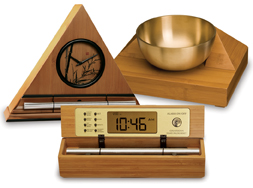 The Zen Alarm Clock transforms mornings, awakening you gradually with a series of gentle acoustic chimes Once you use a Zen Clock nothing else will do Now & Zen – The Singing Bowl Alarm Clock Store
1638 Pearl Street
Boulder, CO 80302
(800) 779-6383
orders@now-zen.com
Posted in Meditation Timers, Meditation Tools, mindfulness practice
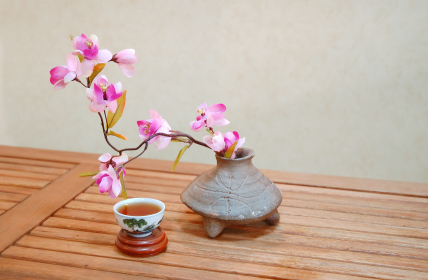 orchid “In the beginner’s mind, there are many possibilities, but in the expert’s mind there are few.”
-Zen Master Suzuki Roshi
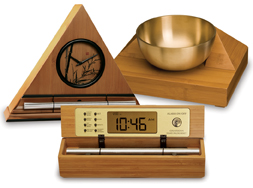 Mindfulness tools for your stillness practice Now & Zen
1638 Pearl Street
Boulder, CO 80302
(800) 779-6383
Posted in Bamboo Chime Clocks
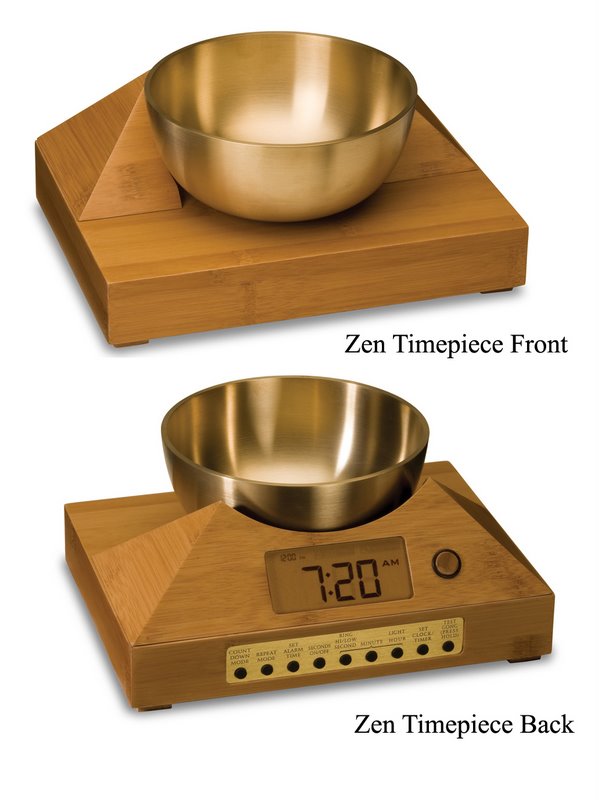 Zen Timepiece for Meditation and Yoga by Shyalpa Tenzin Rinpoche
As beginners, we must embrace the practice of meditation. Even if the discipline of meditation does not come easily, we should endeavor to practice. We have to tame our neuroses and pacify our restless minds.
 Meditation Now & Zen
1638 Pearl St.
Boulder, CO 80302
(800) 779-6383
Posted in Bamboo Chime Clocks
 It's exquisite sounds summon your consciousness out of your meditative state with a series of subtle gongs. Entrepreneurs behave just like most Americans when it come to religion — but with one spiritual twist.
They’re significantly more likely to pray several times a day or to meditate, says sociologist Kevin Dougherty, a co-author of the Baylor Religion Survey.
The survey can’t answer whether prayerful, peaceful folks are more likely to take a business risk or whether the stress of a start-up drives folks to their knees or to the lotus position, Dougherty says.
Questions on entrepreneurs were a part of the survey underwritten by Baylor’s sociology department, the National Study of Religion and Entrepreneurial Behavior and the National Science Foundation.
Either way, 34% of entrepreneurs say they frequently look up to the Lord, compared with 27% of non-entrepreneurs. Nearly as many, 32%, say they look inward in meditation while just 22% non-entrepreneurs say they practice any of the eight forms of mediation, including Christian, Jewish and Buddhist variations, on the survey.
Leading the way: Christian meditation, reported by 18% of entrepreneurs.
Leah Rampy of McLean, Va., who ran her own company as an executive leadership coach, says her prayers were often that “the spirit would work through me.”
Mindful meditation, was cited by 17% of entrepreneurs. Wendy Woods, a consultant based in Toronto shares with her corporate clients how “meditation helps me push away fear and bring in calm and creativity.”
Buddhist meditation worked for Ray Yeh, of Ukiah, Calif., who created and ran a software sales company for 20 years. He found “working 12 hours a day, seven days a week leaves you no time to think, to get in touch with your inner self.” Yeh sold the company in 1999 and now lives in a Buddhist monastery in Northern California.
Psychologist Kenneth Pargament, scholar in residence at the Institute for Spirituality and Health at the Texas Medical Center in Houston, says, “Entrepreneurs have a strong sense they can take matters into their own hands. But they also face risk, unpredictability and uncertainty. Prayer and meditation can be important resources for people who are trying to achieve a lot and yet still face the reality that there is only so much they can control.”
Although meditation can be done in almost any context, practitioners usually employ a quiet, tranquil space, a meditation cushion or bench, and some kind of timing device to time the meditation session. Ideally, the more these accoutrements can be integrated the better. Thus, it is conducive to a satisfying meditation practice to have a timer or clock that is tranquil and beautiful. Using a kitchen timer or beeper watch is less than ideal.
And it was with these considerations in mind that we designed our digital Zen Alarm Clock and practice timer. This unique “Zen Clock” features a long-resonating acoustic chime that brings the meditation session to a gradual close, preserving the environment of stillness while also acting as an effective time signal.
adapted from abcnews.go.com
 Our Yoga and Meditation Timer & Clock can be programmed to chime at the end of the meditation or yoga session or periodically throughout the session as a kind of sonic yantra Now & Zen – The Meditation Timers Shop
1638 Pearl Street
Boulder, CO 80302
(800) 779-6383
orders@now-zen.com
Posted in Bamboo Chime Clocks, Meditation Timers, Meditation Tools, mindfulness practice
 Zen Timepiece with Singing Bowl The basic practice of focusing attention is important, even for the most advanced practitioners. If you allow a glass full of muddy water to sit undisturbed, the dirt will settle to the bottom, leaving a glass of pure water. Practicing this simple technique of focusing and restoring your attention when your mind wanders will pacify your restless thoughts. It will calm your mind, and with sustained practice, you will experience lucidity and pure presence. Using a Zen Timepiece with Singing Bowl will help your body relax when you hear the chime indicating a close to your mindfulness practice.
 Cherry blossoms Now & Zen Headquarter Store
1638 Pearl Street
Boulder, CO 80302
(800) 779-6383
Posted in Bamboo Chime Clocks
 Waking up in the morning should be as pleasant as falling asleep at night. The Zen Alarm Clock's gradual, gentle awakening is transformative. Feeling isolated and disconnected from the people around you may keep you from getting a good night’s sleep, even if you’re not aware of it, a small new study suggests.
People who feel lonely tend to experience more nighttime restlessness and disruptions than their better-adjusted peers, the study found, which may partly explain why loneliness has been associated with health problems such as high blood pressure, heart disease, anddepression, says lead researcher Lianne Kurina, PhD, an assistant professor of epidemiology at the University of Chicago.
“In lab experiments, when people are intentionally woken up repeatedly, it seems to have effects on [their] metabolism,” she says. “Their insulin sensitivity goes down, almost suggesting that poor sleep could put them at higher risk of type 2 diabetes, for example.”
In the new study, published today in the journal Sleep, the link between loneliness and sleep disruptions persisted even after the researchers took into account marital status and family size. This finding underscores an important distinction between loneliness and social isolation, Kurina says: The amount of loneliness people feel ultimately depends on how they perceive their social situation, not the situation per se.
“There can be people with lots of social connections that feel terribly alone, and conversely there are people with relatively small social networks who do just fine,” Kurina says. “Different people have different needs in terms of relationships—and it’s the space between what you want and what you have that can turn into loneliness.”
The 95 participants in the study all had strong social connections, as they were part of a close-knit, rural community in South Dakota. Yet even small differences in their degrees of loneliness had an impact on their sleep.
Kurina and her colleagues asked the participants how often they felt a lack of companionship, left out, or isolated from others, and they used these responses to rate the men and women on a standard loneliness scale. Then, for one week, the participants wore a wrist device to bed each night that records body movement and sleep disruption (known as an actigraph).
 Wake up with gradual, beautiful acoustic chimes. The Zen Alarm Clock transforms your mornings and gets you started right, with a progressive awakening Each one-point increase in the loneliness scale was associated with about an 8% increase in sleep disruptions and restlessness, the researchers found, even when they controlled for age, sex, body mass index, the breathing disorder known as sleep apnea, and negative emotions such as depression, anxiety, and stress.
Loneliness did not appear to influence sleep quality or daytime sleepiness, however, which suggests that the sleep disruptions were minor. More research will be needed to determine if these low-level disruptions can have effects on health similar to those seen in experiments when volunteers are woken up, but it seems plausible that comparable health consequences could occur, Kurina says.
It makes sense that someone who feels alone and vulnerable may wake more easily throughout the night, since early humans may have evolved this tendency to protect against potential threats, the study notes. Even now, Kurina says, short-term feelings of loneliness can be healthy because they can encourage humans to make social connections. Problems can arise, however, if loneliness becomes chronic.
“People who have been very lonely for a while start to expect rejection, to the point where it can become a self-fulfilling prophecy,” Kurina says. For this reason, she adds, it isn’t always helpful to tell someone who feels isolated and insecure to just make friends, get a pet, or go on more dates.
So what’s a lonely heart to do? Begin to rebuild social connections in an emotionally safe way, Kurina suggests. “Engage in situations where you’re not necessarily expecting people to give to you, but where you’re the one giving—like volunteering, or common-interest meetings like book groups,” she says. “Slowly you’ll begin to see the world—and see your relationships—in a more positive way.”
Wake up refreshed, love your alarm clock, transform your mornings with The Zen Alarm Clock’s progressive awakening with gentle chimes.
One of the ultimate Zen like experiences is waking-up from a great slumber refreshed and energized. Your mind and body are harmoniously one, both alert and focused. Having a refreshed mind and body are two keys to a natural and Zen lifestyle. Waking up in the morning should not be a loud and abrupt awakening, but rather it should be a peaceful positive experience. The right natural alarm clock can transition your deep and tranquil sleep into a serene start to consciousness. Imagine a long-resonating Tibetan bell-like chime waking you up to a beautiful morning experience.
The right alarm clock can be the most beneficial investment for you. With our Now & Zen natural alarm clock you are awakened more gradually and thus more naturally. Now & Zen is focused on creating a naturalistic lifestyle, and our clocks are an example of our philosophy.
adapted from Health.com by By Amanda MacMillan
 The Zen Alarm Clock transforms mornings, awakening you gradually with a series of gentle acoustic chimes Once you use a Zen Clock nothing else will do  The Zen Alarm Clock transforms mornings, awakening you gradually with a series of gentle acoustic chimes Once you use a Zen Clock nothing else will do Now & Zen – The Gentle Chime Alarm Clock & Timer Store
1638 Pearl Street
Boulder, CO 80302
(800) 779-6383
orders@now-zen.com
Posted in sleep, Sleep Habits
 One of the ultimate Zen like experiences is waking-up from a great slumber refreshed and energized. Your mind and body are harmoniously one, both alert and focused. Having a refreshed mind and body are two keys to a natural and Zen lifestyle. Getting too little sleep can make you hungrier than normal and may lead to weight gain, a small study suggests.
The team at Uppsala University in Sweden used functional MRI to observe the brains of 12 normal weight males while they looked at images of food. This was done on two occasions — after a night of normal sleep and after a night without sleep.
The results showed that a specific brain region that plays a role in appetite shows more activation in response to food images after a night without sleep than after a night of normal sleep.
This suggests that poor sleep habits can affect a person’s risk of becoming overweight in the long run, according to the study published online Jan. 18 in the Journal of Clinical Endocrinology and Metabolism.
“After a night of total sleep loss, these males showed a high level of activation in an area of the brain that is involved in a desire to eat,” researcher Christian Benedict said in a university news release.
“Bearing in mind that insufficient sleep is a growing problem in modern society, our results may explain why poor sleep habits can affect people’s risk to gain weight in the long run. It may therefore be important to sleep about eight hours every night to maintain a stable and healthy body weight,” Benedict added.
 Waking up in the morning should be as pleasant as falling asleep at night. The Zen Alarm Clock's gradual, gentle awakening is transformative. More information
The U.S. Centers for Disease Control and Prevention has more aboutpreventing weight gain.
– Robert Preidt
SOURCE: Uppsala University, news release, Jan. 18, 2012
One of the ultimate Zen like experiences is waking-up from a great slumber refreshed and energized. Your mind and body are harmoniously one, both alert and focused. Having a refreshed mind and body are two keys to a natural and Zen lifestyle. Waking up in the morning should not be a loud and abrupt awakening, but rather it should be a peaceful positive experience. The right natural alarm clock can transition your deep and tranquil sleep into a serene start to consciousness. Imagine a long-resonating Tibetan bell-like chime waking you up to a beautiful morning experience.
The right alarm clock can be the most beneficial investment for you. With our Now & Zen natural alarm clock you are awakened more gradually and thus more naturally. Now & Zen is focused on creating a naturalistic lifestyle, and our clocks are an example of our philosophy.
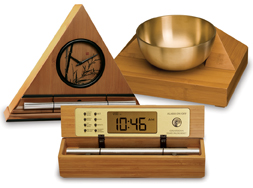 Wake up refreshed, love your alarm clock, transform your mornings with The Zen Alarm Clock's progressive awakening with gentle chimes. Now & Zen – The Acoustic Chime Alarm Clock Store
1638 Pearl Street
Boulder, CO 80302
(800) 779-6383
orders@now-zen.com
Posted in Bamboo Chime Clocks
 One of the ultimate Zen like experiences is waking-up from a great slumber refreshed and energized. Your mind and body are harmoniously one, both alert and focused. Having a refreshed mind and body are two keys to a natural and Zen lifestyle. People may be learning while they sleep, dramatically improving their memory in some cases, a new study suggests.
Although the effects on memory vary greatly and are not well understood, Michigan State University researchers said their findings reinforce the need for a good night’s sleep — something 63 percent of Americans are not getting, according to the U.S. National Sleep Foundation.
“We speculate that we may be investigating a separate form of memory, distinct from traditional memory systems,” lead researcher Kimberly Fenn, an assistant professor of psychology, said in a university news release. “There is substantial evidence that during sleep, your brain is processing information without your awareness and this ability may contribute to memory in a waking state.”
Researchers studied more than 250 people and found that some had significant enhancement in their memory, while others had no change at all. They found, however, that most participants showed improvement.
More research is needed to explore whether or not this potential memory ability could boost academic performance, the study authors said in the news release.
“Simply improving your sleep could potentially improve your performance in the classroom,” concluded Fenn.
Boulder, Colorado—an innovative company has taken one of life’s most unpleasant experiences (being startled awake by your alarm clock early Monday morning), and transformed it into something to actually look forward to. “The Zen Alarm Clock,” uses soothing acoustic chimes that awaken users gently and gradually, making waking up a real pleasure. Rather than an artificial recorded sound played through a speaker, the Zen Clock features an alloy chime bar similar to a wind chime. When the clock’s alarm is triggered, its chime produces a long-resonating, beautiful acoustic tone reminiscent of a temple gong. Then, as the ring tone gradually fades away, the clock remains silent until it automatically strikes again three minutes later. The frequency of the chime strikes gradually increase over ten-minutes, eventually striking every five seconds, so they are guaranteed to wake up even the heaviest sleeper. This gentle, ten-minute “progressive awakening” leaves users feeling less groggy, and even helps with dream recall.
 Waking up in the morning should not be a loud and abrupt awakening, but rather it should be a peaceful positive experience. The right natural alarm clock can transition your deep and tranquil sleep into a serene start to consciousness. The study was published recently in the Journal of Experimental Psychology: General.
More information
The American Psychological Association provides more information on theimportance of sleep.
– Mary Elizabeth Dallas
SOURCE: Michigan State University, news release, September 2011
Now & Zen – The Soothing Alarm Clock Store
1638 Pearl Street
Boulder, CO 80302
(800) 779-6383
orders@now-zen.com
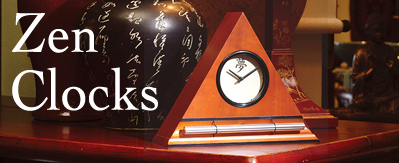 Imagine a long-resonating Tibetan bell-like chime waking you up to a beautiful morning experience.
Posted in sleep
|
|
|
|